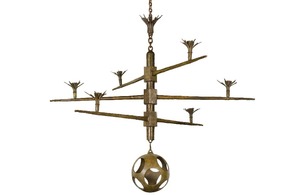Giacometti bronze chandelier at risk of leaving UK
Export bar placed on £2.9 million chandelier to allow time for a UK institution to acquire the work

- Avant-garde bronze chandelier commissioned by Peter Watson in 1940s
- Giacometti is regarded as one of the most important sculptors of the 20th century
A unique bronze chandelier designed by renowned Swiss sculptor Alberto Giacometti shortly after the Second World War is at risk of leaving the UK unless a domestic buyer can be found.
The chandelier, which is worth £2,922,000 plus VAT, is made from bronze and has a multi-layered armature, with sharply pointed branches radiating out from a central stem. Each socket is decorated with organic detailing and hanging from the base of the main stem is a punctuated sphere.
The piece was commissioned in 1947 from Giacometti by Peter Watson, a significant figure in the cultural life of mid-century Britain whose patronage of the arts and the influential Horizon magazine helped shape modern British painting, sculpture, and literature.
The piece is particularly valuable given Giacometti is widely regarded as one of the most important sculptors of the 20th century and it was commissioned specifically for the offices of Horizon magazine. As a result, the chandelier is of particular interest for the study of mid-century European avant-garde art.
Arts & Heritage Minister Lord Parkinson of Whitley Bay said:
Giacometti’s masterful exploration of space and use of bronze in this extraordinary chandelier provided a centrepiece for cultural discussion in post-war London as it hung in the offices of avant garde magazine, Horizon.
It is a prime example of sculptors blurring the boundaries between function and art in the decorative arts.
The minister’s decision follows the advice of the Reviewing Committee on the Export of Works of Art and Objects of Cultural Interest (RCEWA).
Andrew Hochhauser KC, Chair RCEWA said:
Giacometti’s bronze chandelier was commissioned in about 1947 by Peter Watson, a significant figure in cultural life in the mid-20th century, a great patron of the arts in Britain and the co-founder of the literary and cultural magazine, Horizon, for its new offices in Bedford Square. It is an exceptional realisation of Giacometti’s work in the decorative arts and is the only known UK decorative art commission by the leading 20th century sculptor. It offers outstanding opportunities for the study of this neglected area of Giacometti’s output and the meeting of European avant-garde art and decorative arts in the mid-twentieth century. I sincerely hope it can find a home in this country where it can be studied and enjoyed.
The committee made its recommendation on the basis that the chandelier met the first, second and third Waverley criteria for its outstanding connection with our history and national life, its outstanding aesthetic importance and its outstanding significance to the study of Giacometti’s work in the decorative arts and the meeting of European avant-garde art and decorative arts in the mid-20th century.
The decision on the export licence application for the chandelier will be deferred for a period ending on 12th November 2023. At the end of the first deferral period owners will have a consideration period of 15 Business Days to consider any offer(s) to purchase the chandelier at the recommended price of £2,922,000 (plus VAT of £104,000 which can be reclaimed by an eligible institution). The second deferral period will commence following the signing of an Option Agreement and will last for four months.
Notes to editors:
-
In December 2022, Lord Parkinson discussed the Waverley criteria in a speech to mark their 70th anniversary, and used the opportunity to invite thoughts on the way they work – for instance, whether the Committee should say more about how it has considered items’ connection to the history of other countries as well as to the UK’s, or whether the items it considers are destined for public display rather than private collection. His full speech can be found on gov.uk.
-
Organisations or individuals interested in purchasing the sculpture should contact the RCEWA on 0161 934 4317.
-
Details of the chandelier is as follows: Chandelier for Peter Watson was commissioned from Alberto Giacometti (1901-1966) by Peter Watson (1908-1956) between 1946-47 and was probably cast with assistance from Diego Giacometti (1902-1985) c.1947-1949. The chandelier is made from bronze with a golden-brown patina and measures 134cm in height and 153.5cm in diameter. It has a multi-layered armature, with sharply pointed branches radiating out from a central stem. Each socket is decorated with organic detailing and hanging from the base of the main stem is a punctuated sphere. The chandelier is unique and is in excellent condition.
-
Provenance: Peter Watson, Paris & London, by whom commissioned directly from the artist for the Horizon magazine office, London. (Probably) Cyril Connolly, London. Elizabeth Denton, London, circa 1965. John Craxton, R.A., London, by whom acquired from the above in the late 1960s, and thence by descent.
-
The Reviewing Committee on the Export of Works of Art and Objects of Cultural Interest is an independent body, serviced by Arts Council England (ACE), which advises the Secretary of State for Culture, Media and Sport on whether a cultural object, intended for export, is of national importance under specified criteria.
-
Arts Council England is the national development agency for creativity and culture. Its strategic vision in Let’s Create is that, by 2030, England should be a country in which the creativity of everyone is valued and given the chance to flourish and where everyone has access to a remarkable range of high-quality cultural experiences. ACE invests public money from the government and the National Lottery to support the sector and deliver the vision. Following the Covid-19 crisis, ACE developed a £160 million Emergency Response Package, with nearly 90 per cent coming from the National Lottery, for organisations and individuals needing support. It is also one of the bodies administering the government’s unprecedented Culture Recovery Fund.